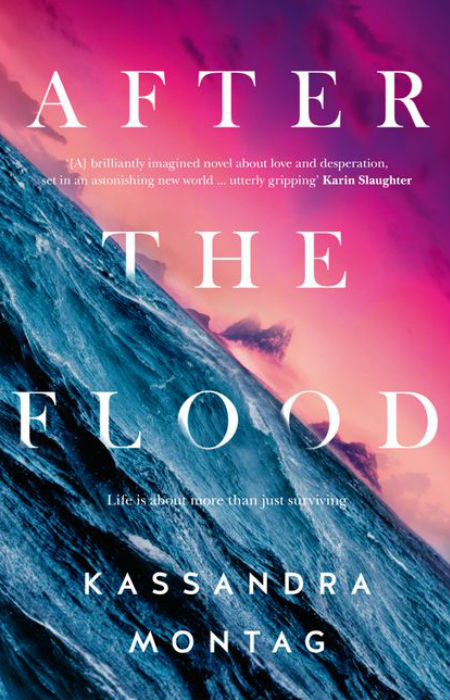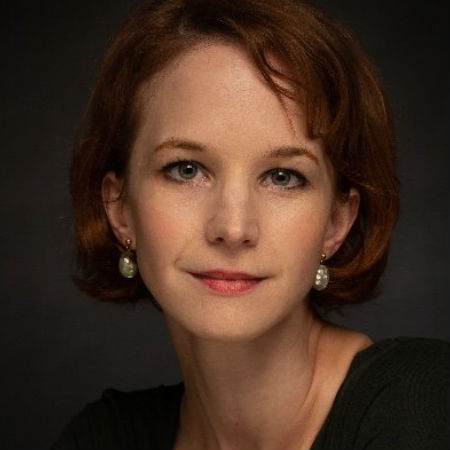
As a species, humanity is deeply attached to the idea that adversity builds some kind of nobility of purpose, that by going through metaphorical fire we are somehow purged of our lesser selves and emerge with a flawless, unimpeachable self.
It’s a heartwarming idea and so it’s no surprise we treasure it so much, but as Kassandra Montag beautifully and hauntingly explores in After the Flood, we are just as prone to finding ourselves mired deeply and messily in a thousand competing emotions, all of them self-serving in some way as we are to rise triumphantly like the heroes of old.
But in this affecting tale of one mother’s quest for her missing daughter, an understandable obsession that comes close to costing the daughter still with her and the man she has come to love, we come face-to-face with the all-too-real understanding that we are more likely to dine with the lesser angels of our nature than those on a higher plain.
That may sound brutally confronting but the way Montag tells it, in a grounded lyricism that is as beautiful as it is real, it is liberating, freeing us from an onerous sense that great adversity will build a finer, selfless person, a task that sounds far too weighty for a mere mortal to contemplate, let alone attempt.
“When I think of those days, of losing the people I’ve loved, I think of how my loneliness deepened, like being lowered into a well, water rising around me as I clawed at the stone walls, reaching for sunlight. How you get used to being at the bottom of a well. How you wouldn’t recognize a rope if it was thrown down to you?” (P. 48)
Certainly, Myra, who fled the now watery expanse of Nebraska in a homemade boat with a man known only as Grandfather and pregnant with her daughter, as the great storm surges reduced the great sprawling continents of earth to mountainous rumps, is under no illusion about what really happens to a person under apocalyptic conditions.
They remain stubbornly, often cruelly flawed, as capable of dooming others as elevating them, and while Myra is not a terrible person – she is well aware of her “sins” and tormented by the darkness she chooses when the light is clearly visible before her – her only focus is protecting her highly-capable eight-year-old daughter Pearl who, though she might be skilled in sailing boats and skinning snakes (you eat what you can) is still, in many ways, a kid.
She gets scared, like any child would, of monsters that lurk in the dark, and in a broken world where survival is far from a given and grief and loss are exhaustingly commonplace, there are plenty of monsters to fear.
Amidst the vast reaches of open water that swirl around the archipelago of mountaintop colonies in which humanity’s scattered remnants try to forge some kind of life, there are pirates, militaristic cabals forge societies riven by violent coercion and vengeful enforcement, enslaving women for breeding purposes and enforcing a mafia-like system of tributes from colonies in exchange for protection (a devilish pact if ever there was one).
For a child borne atop the water, Pearl is afraid of the water, an irony that amuses and terrifies Myra in equal measure as she gives all she has to safeguard the one remaining person in the world who matters to her.

Hers is a fierce and self-sacrificing mother’s love that in and of itself is noble, but when word comes that her missing daughter may be in a far off colony, Myra risks everything, and the lives and dreams of a great many other people, to save the missing part of herself.
She doesn’t suddenly transform into some kind of brutalist monster but she begins to make choices that preference what she wants over what others need and deserve, a development that she struggles with but which she rationalises as reasonable given what is at stake.
So not so much hero-like and more feet-of-clay human; Montag does an exemplary, moving job of rendering Myra in ways that paint as someone who isn’t evil but simply trying to do what she has to to survive and to rescue her missing daughter and safeguard the one who is with her.
It’s not a perfect path but it’s one that makes sense if you are truly honest with yourself – we all like to think of ourselves as people who would give up a great deal of what we want for the greater good if we found ourselves in an apocalyptic environment but is that really that case?
Would we put aside our innate selfishness, and truth be told we all have it to greater or lesser extents, for others and would, like Myra, sacrifice nascent hope and a beguiling sense of family for the driving goal at hand (and would we see those good and wonderful things as they really are after so long without them?)
“Resentment burned in me. I wanted to tell her that it wasn’t that I loved Row more, but that I had other, darker things in me that turned my decisions. My rage and my fear. They got all mixed up with my love and I couldn’t separate them. They were like the sky when it melts into the sea, how you can’t tell where one begins and the other ends.
She’d never be able to understand the weight of it all. The impossible choices. We were living this life together, but we might as well have been in separate worlds for all we knew of each other.” (P. 314)
After the Flood paints an affecting, grounded picture of a woman who is tempted by hope, of the idea that she can become part of a newly-formed family and put aside, to some extent at least, bearing the weight of the world upon her shoulders.
Myra is all of us – caring, loving and selfless in some ways especially when it comes to Pearl and yet brutally obsessed and bloodily efficient when it comes to realising what she wants, or needs, from life in a world that cares little for her welfare and that of many others who choose freedom over tyranny, humanity over collective cruelty.
Pinned between the tormenting darkness of despair and the lingering hope that some good things in life are still possible, even if there is a great many terrible things that must be countenanced to make them happen, After the Flood presents us with a likeable, flawed person whose motivations, if we’re truly honest, make perfect sense to all of us.
Would we like to be better than that? Of course, we would; humanity is, as a whole, enamoured with the idea of a perfect expression of who we are and who long to be.
But the reality is we aren’t perfect, and certainly not in a world as broken as the flooded one in After the Flood, where the adventure takes us from North to South America and onto Greenland (well, what’s left of them), and as we witness Myra thrillingly-intense physical and existential journeys, and the quietly reflective, ever more honest moments in-between, that maybe the best we can hope for is to put one foot in front of the other and pray we don’t lose our humanity in the process.